实例介绍
【实例简介】C Primer, Fifth Edition
C Primer第五版,不用多说经典C 教材,这是英文版,喜欢阅读英文原版的同学可下载学习
【实例截图】
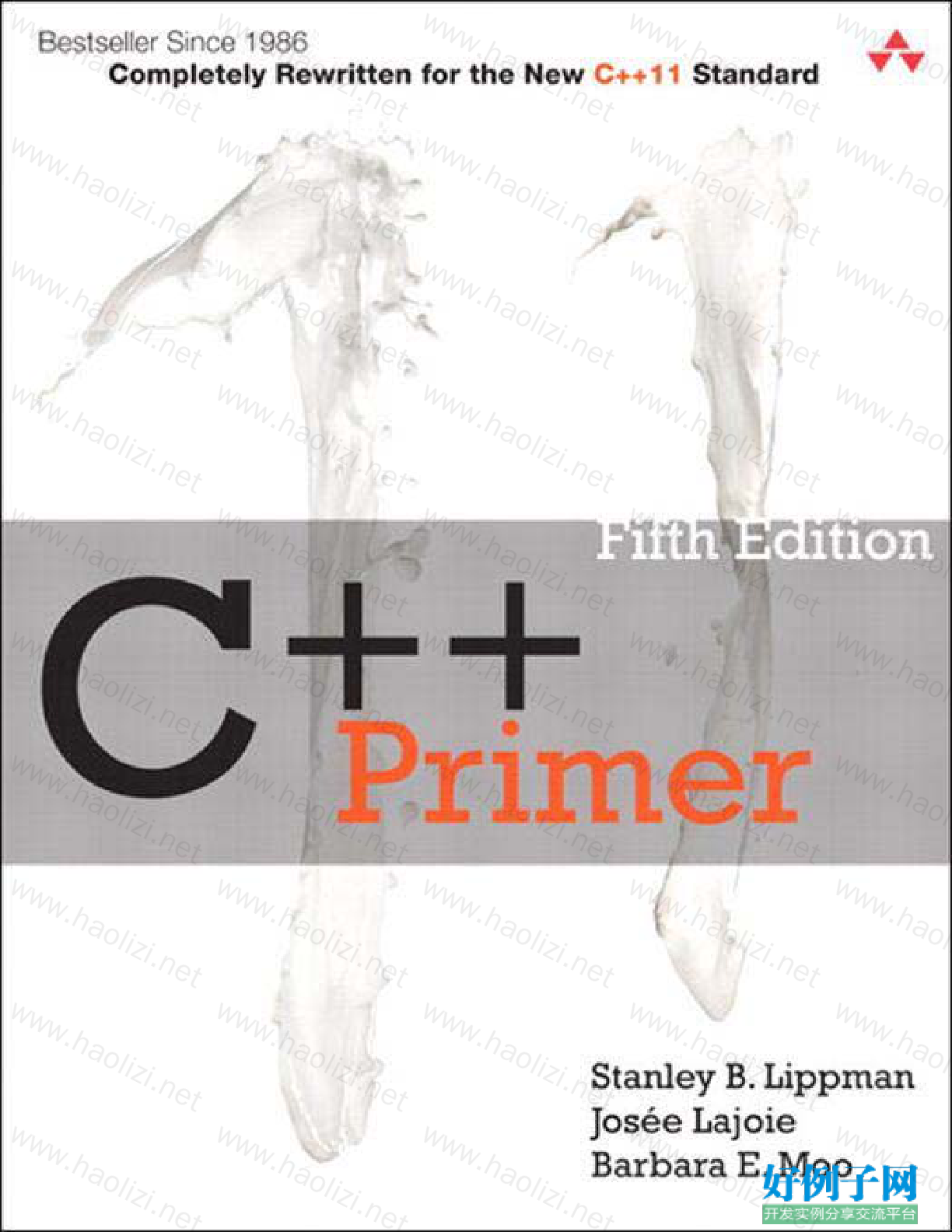
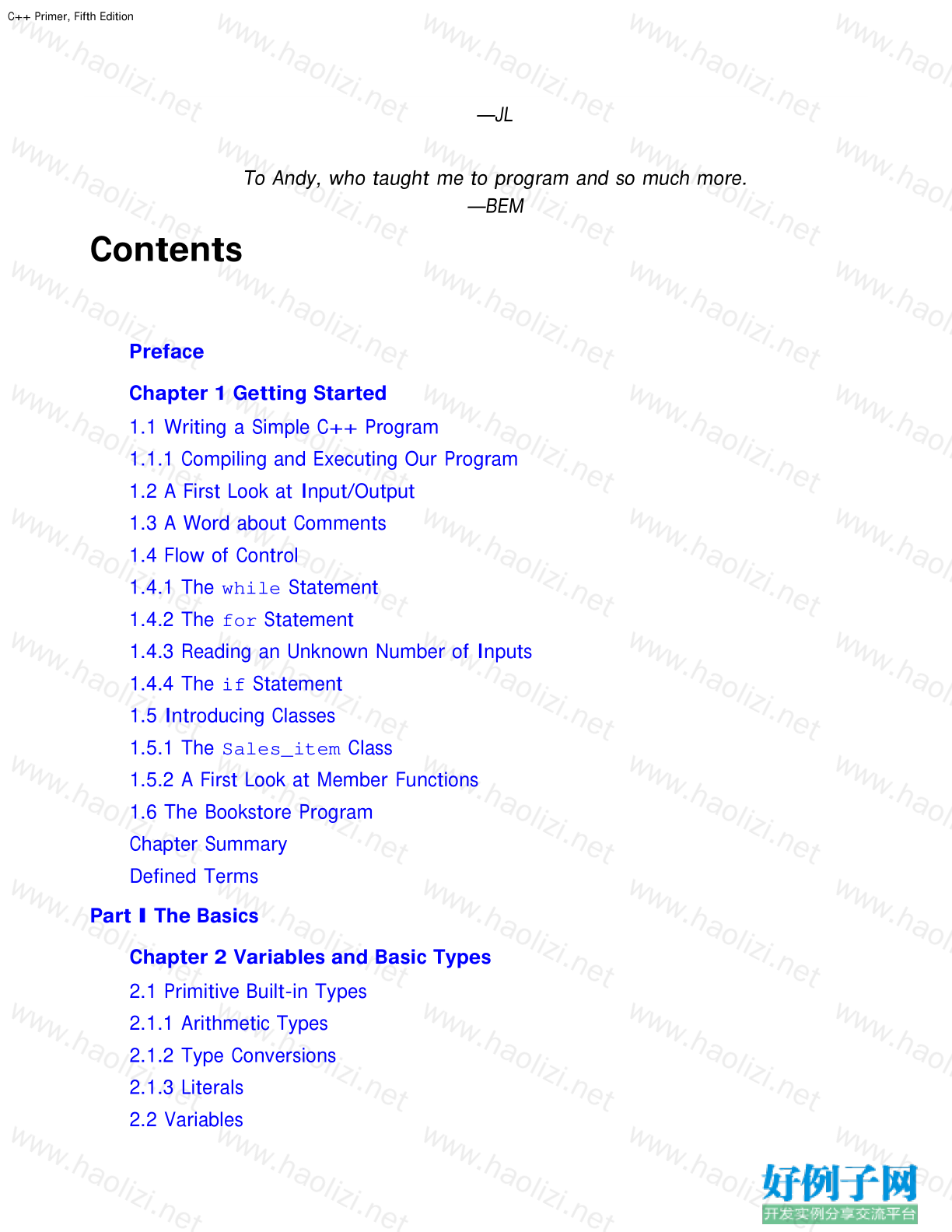
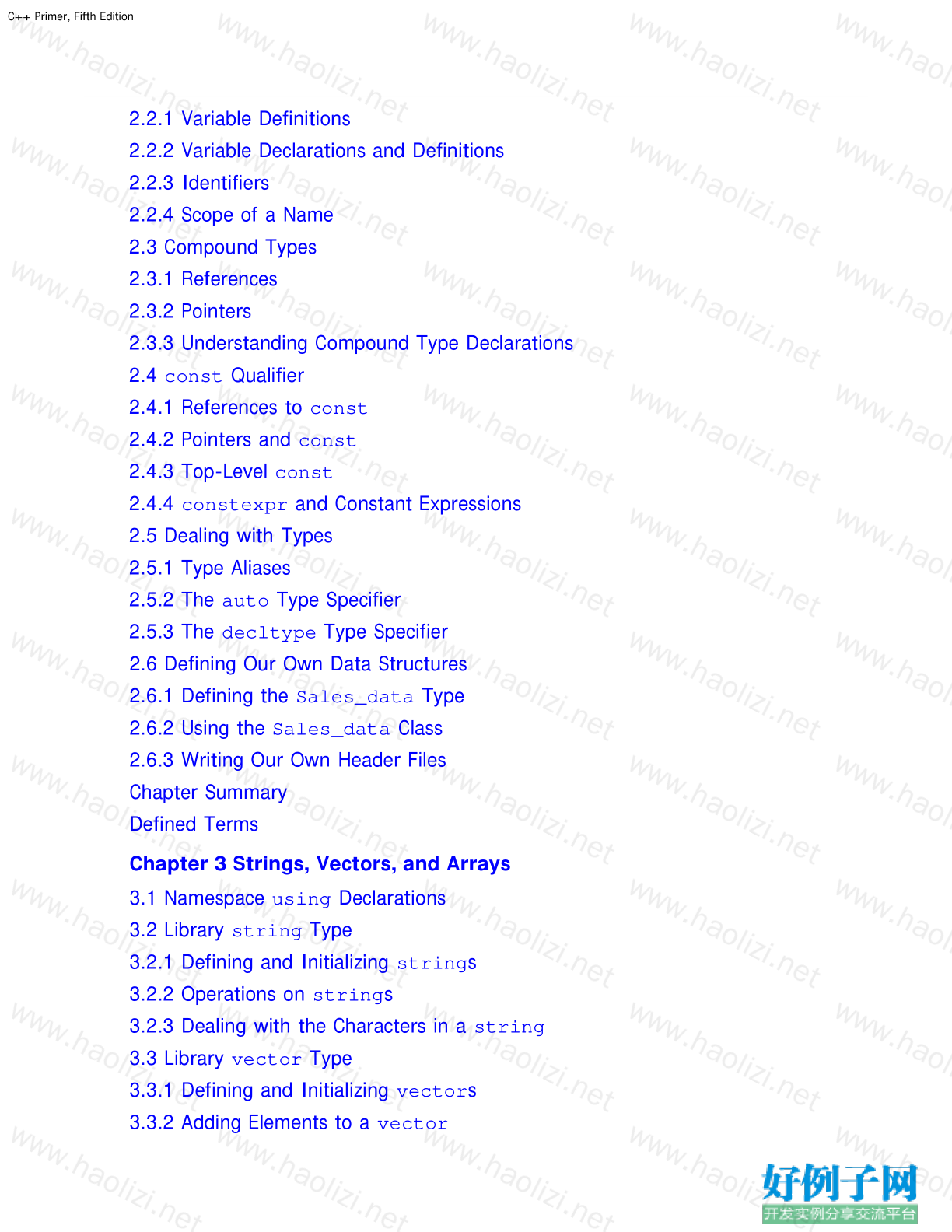
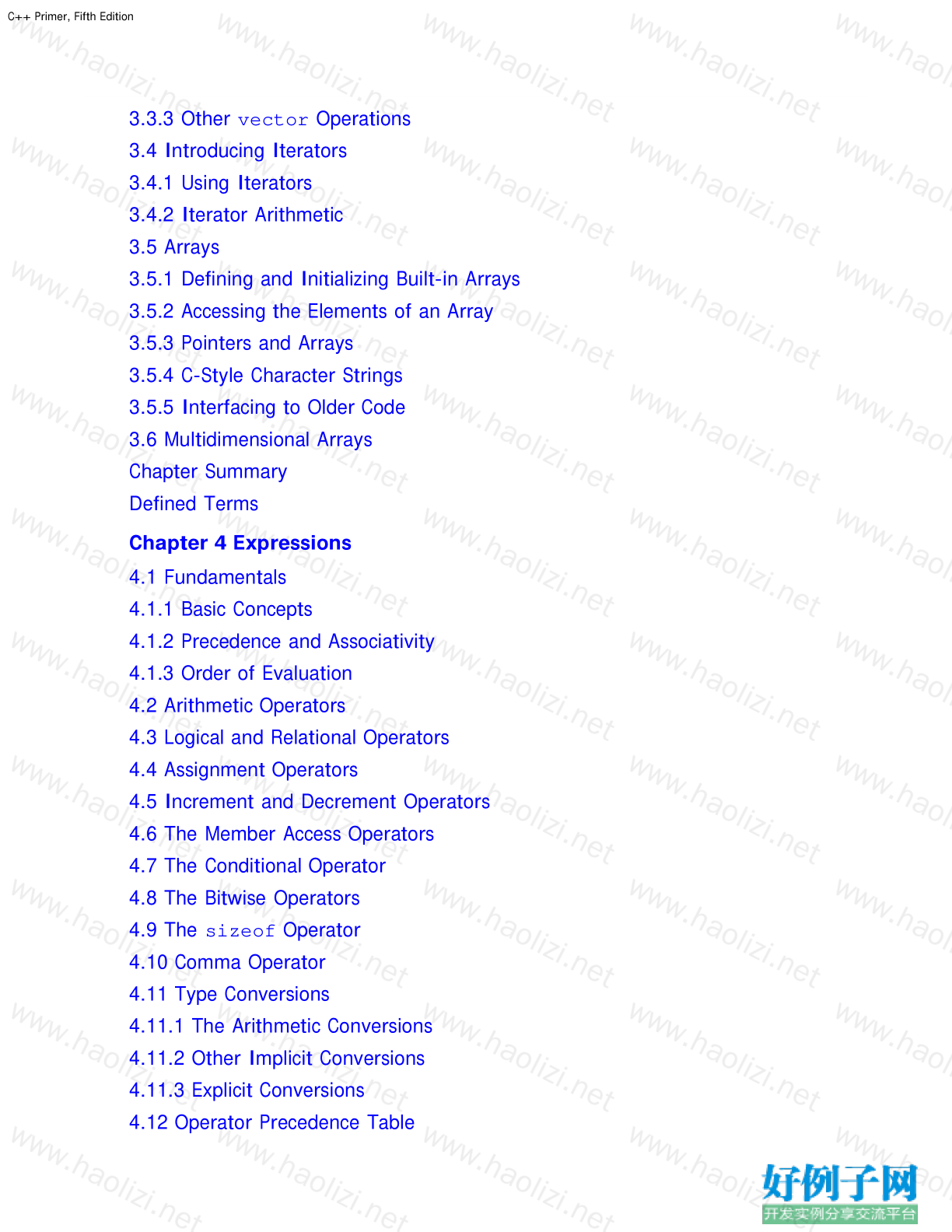
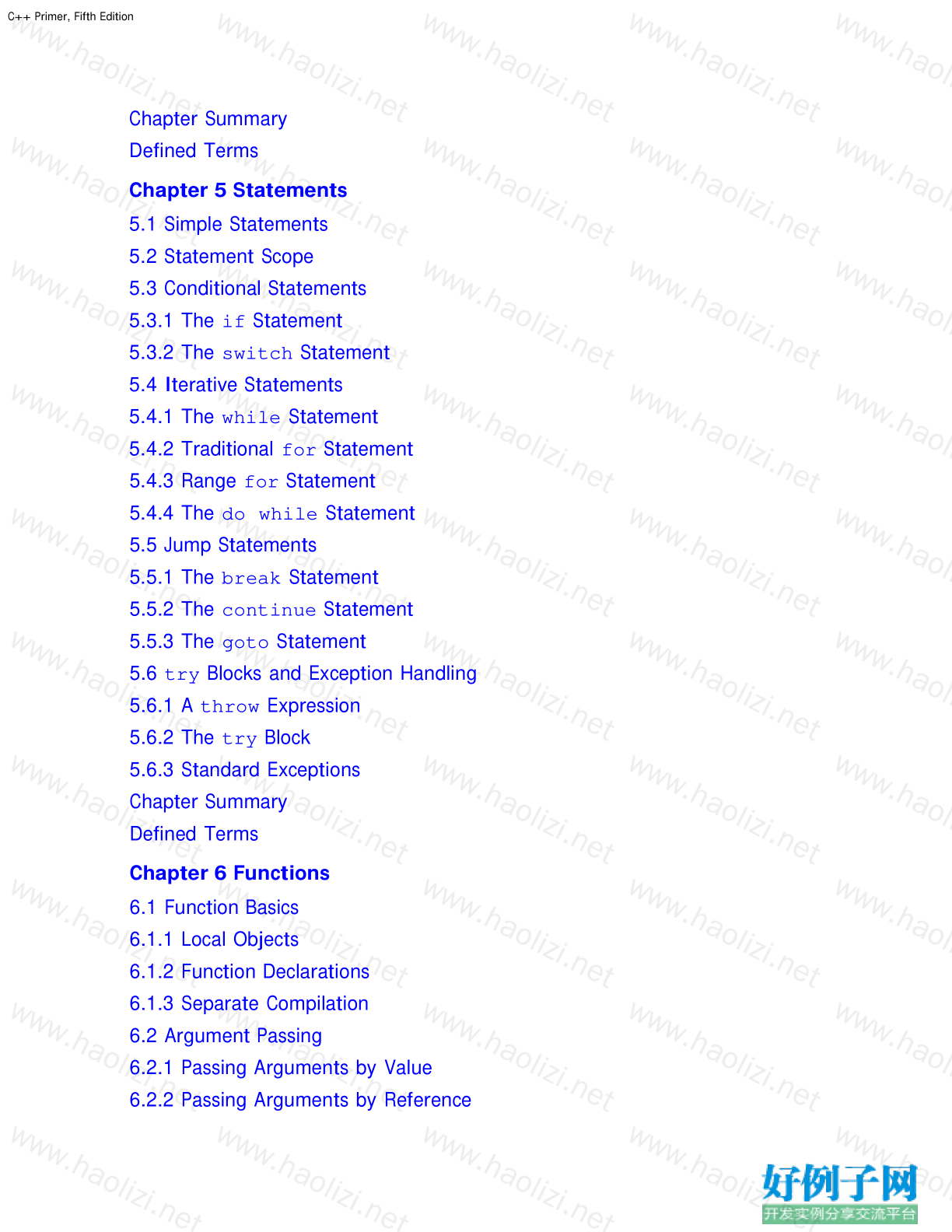
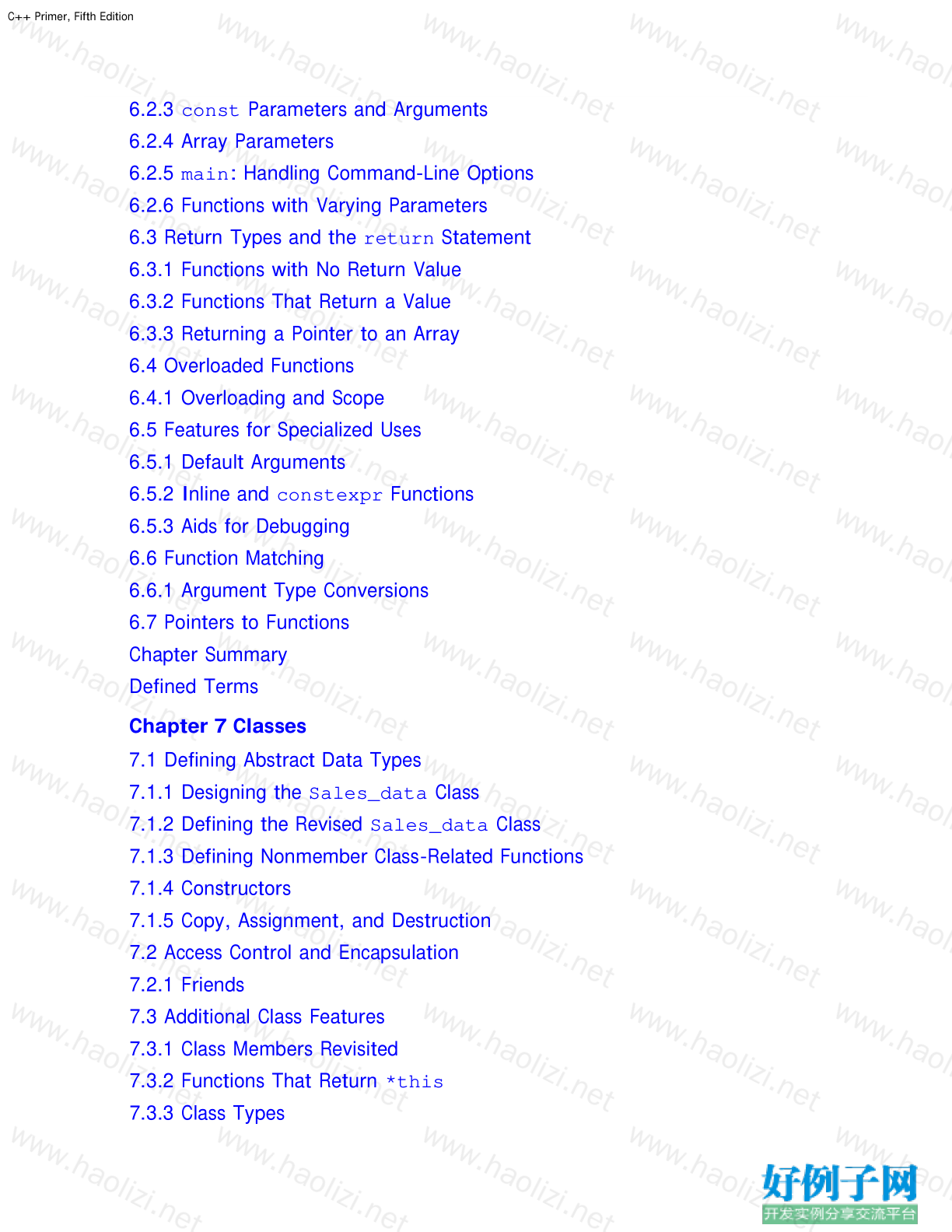
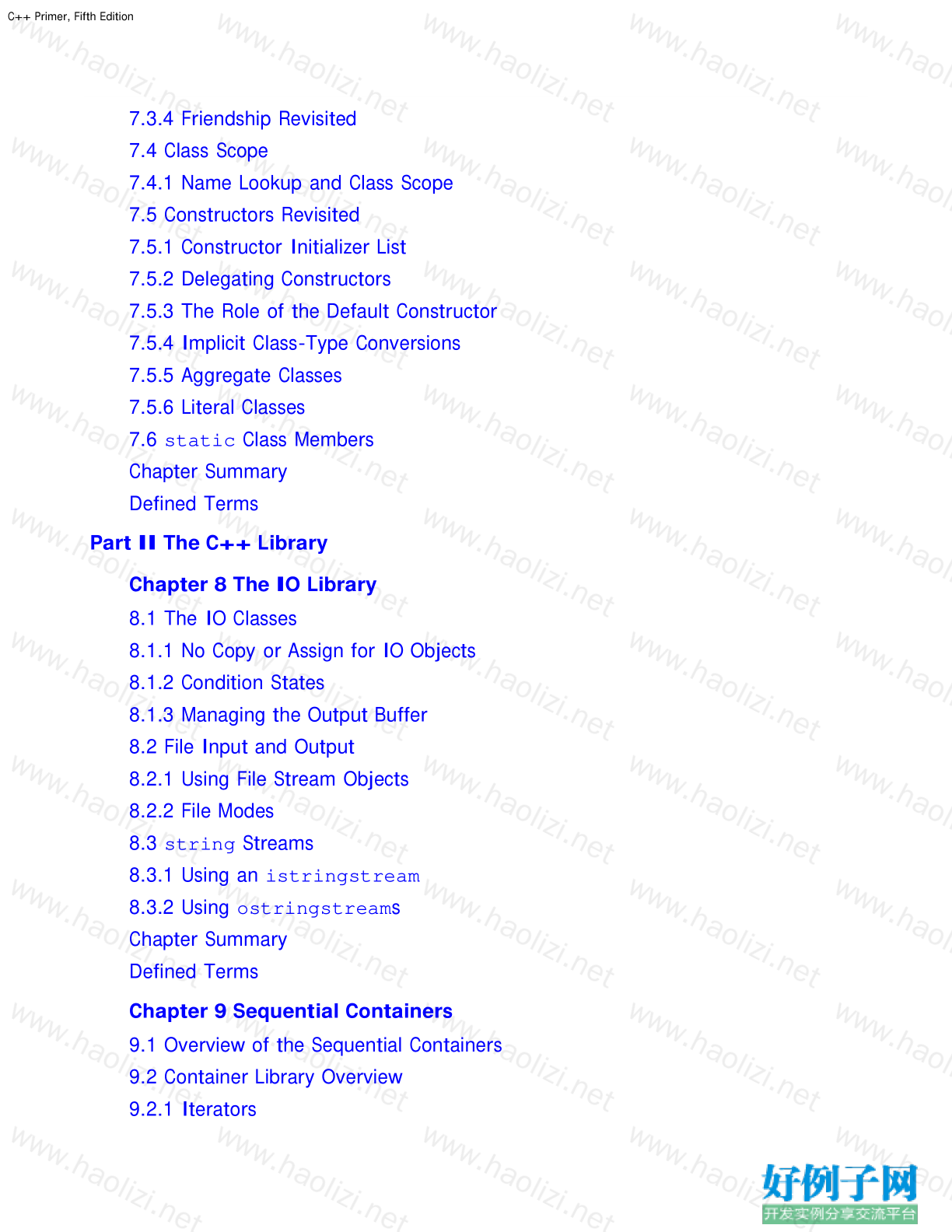
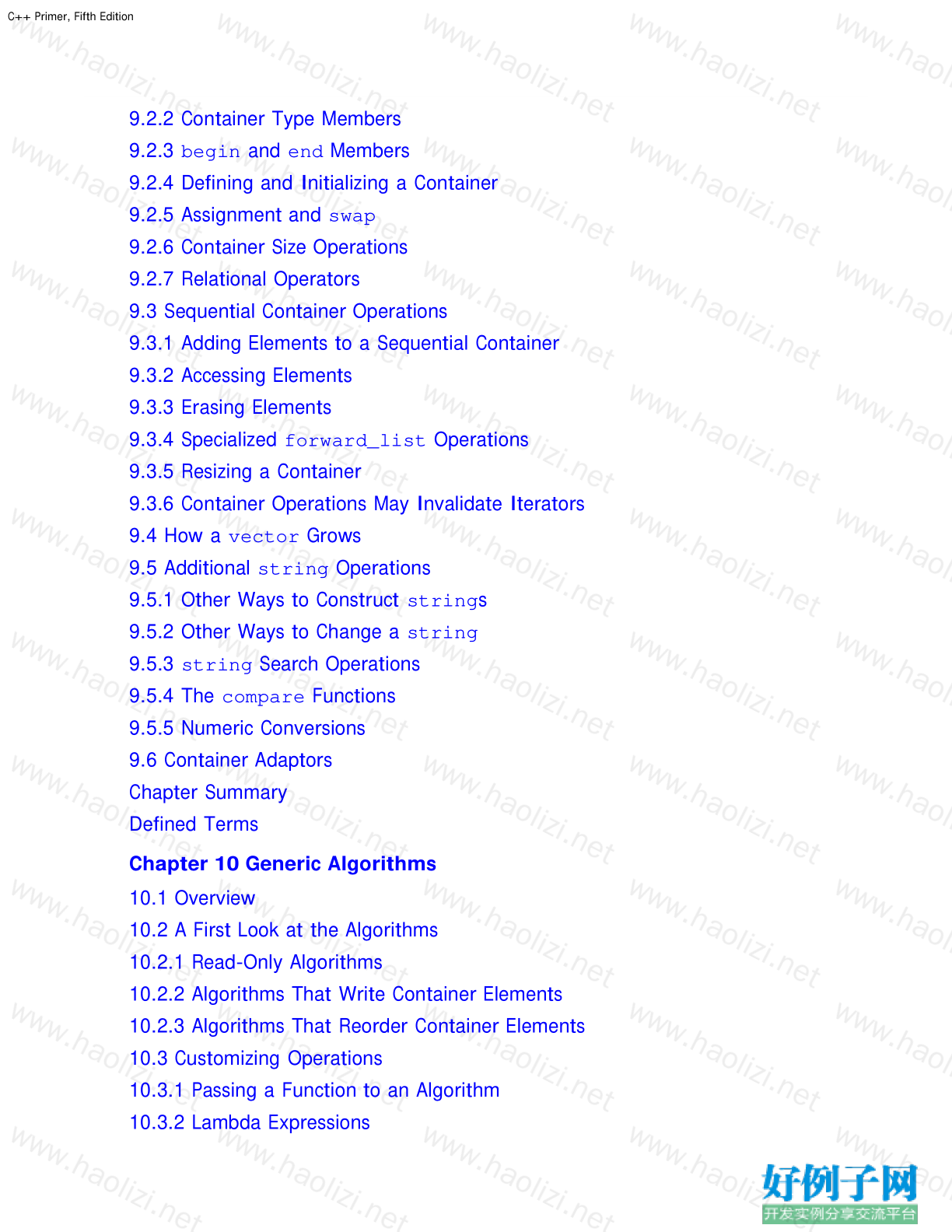
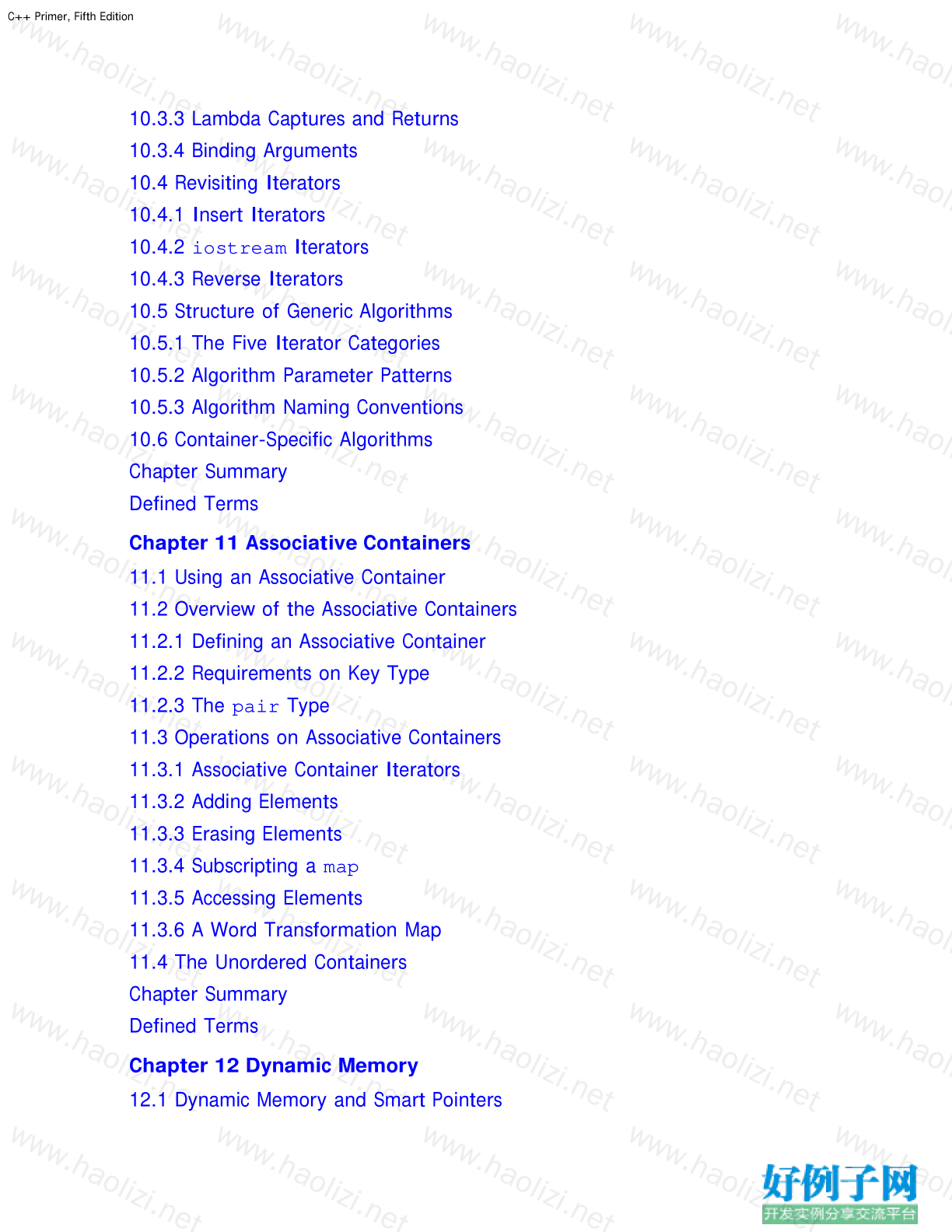
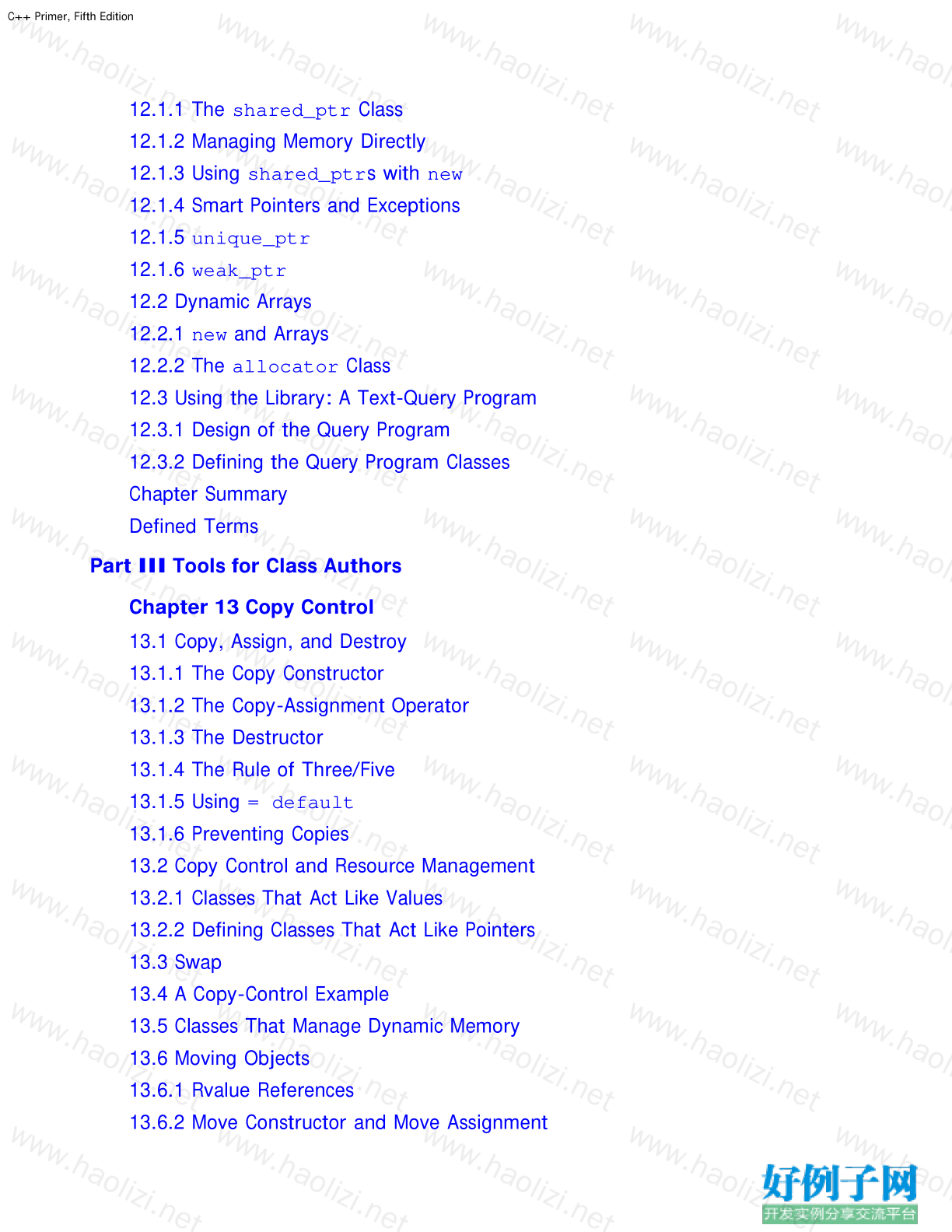
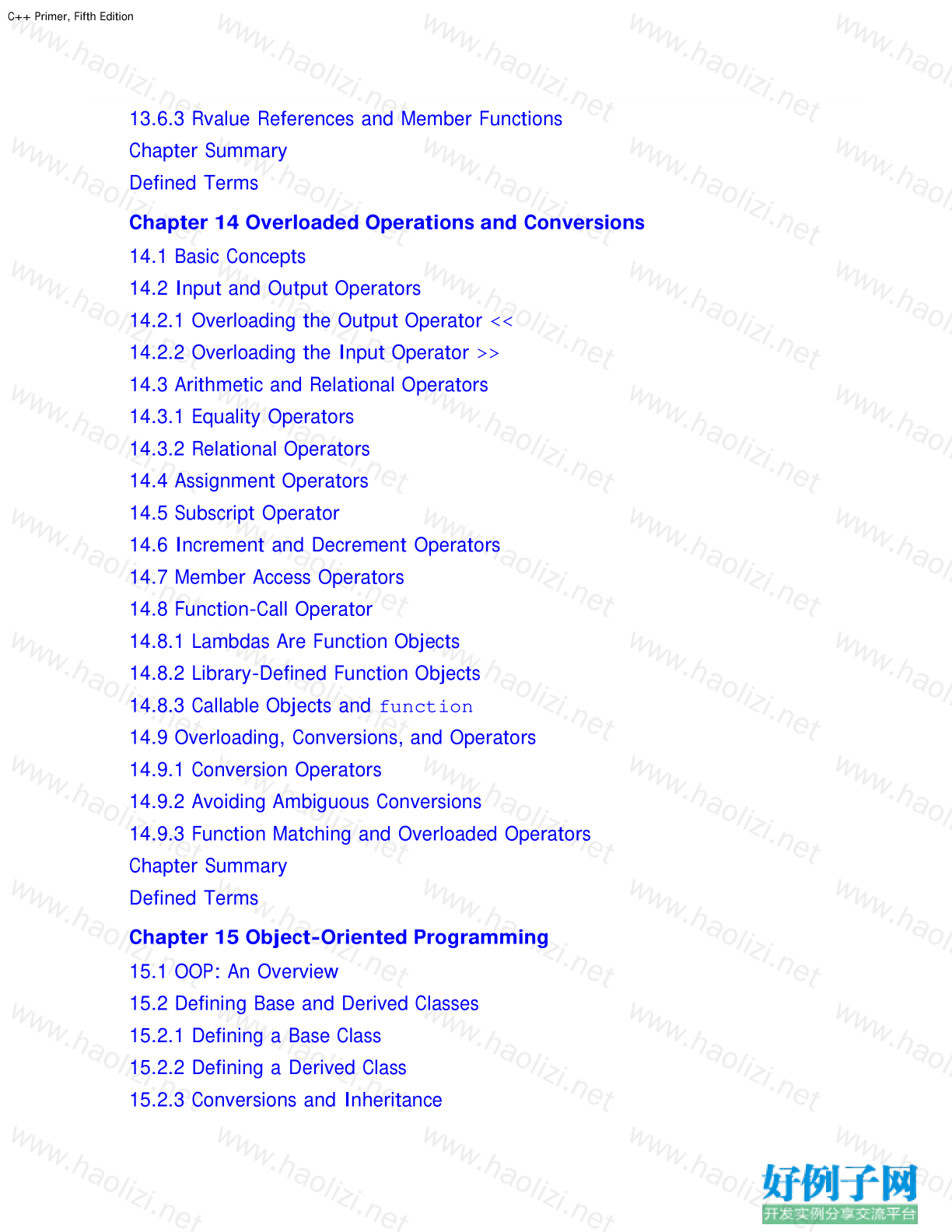
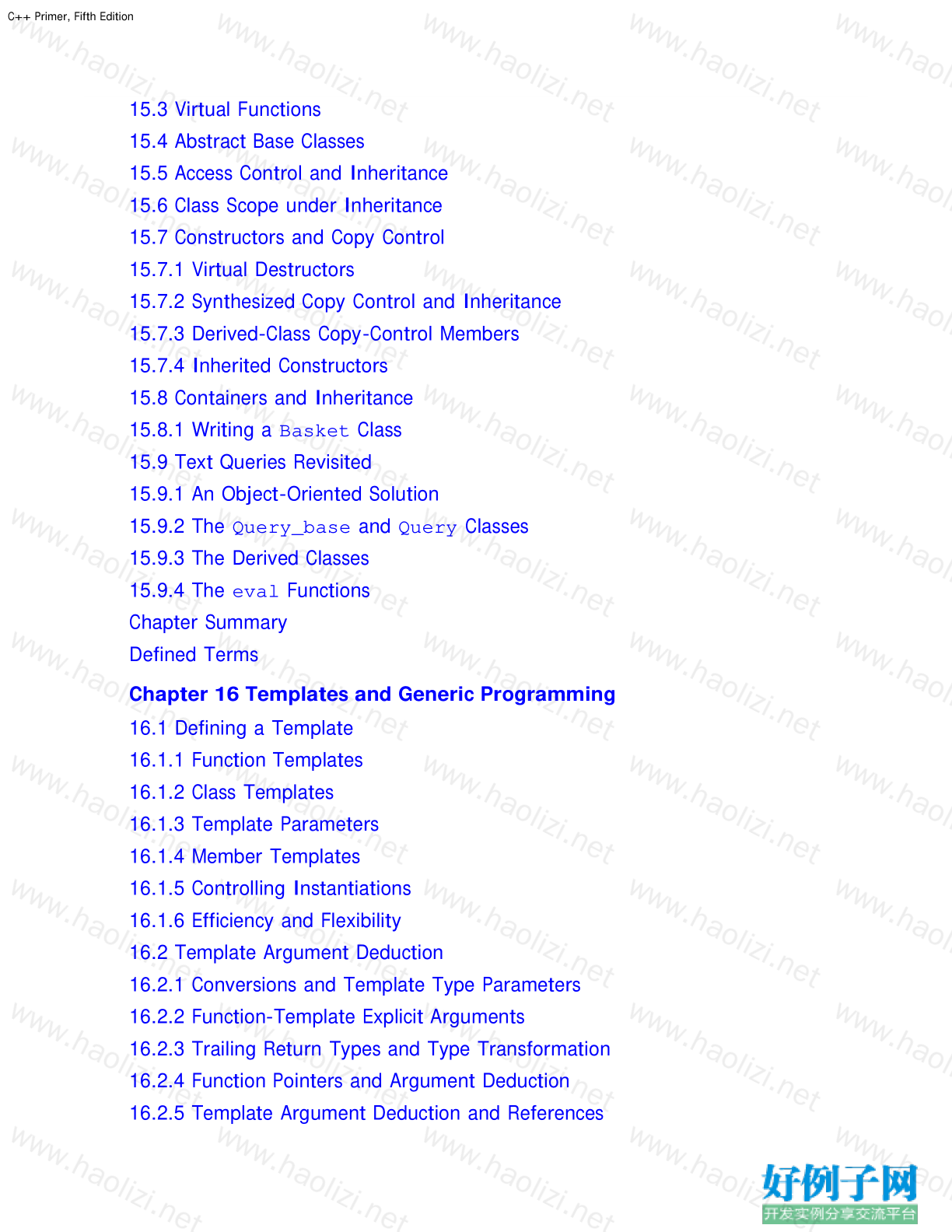
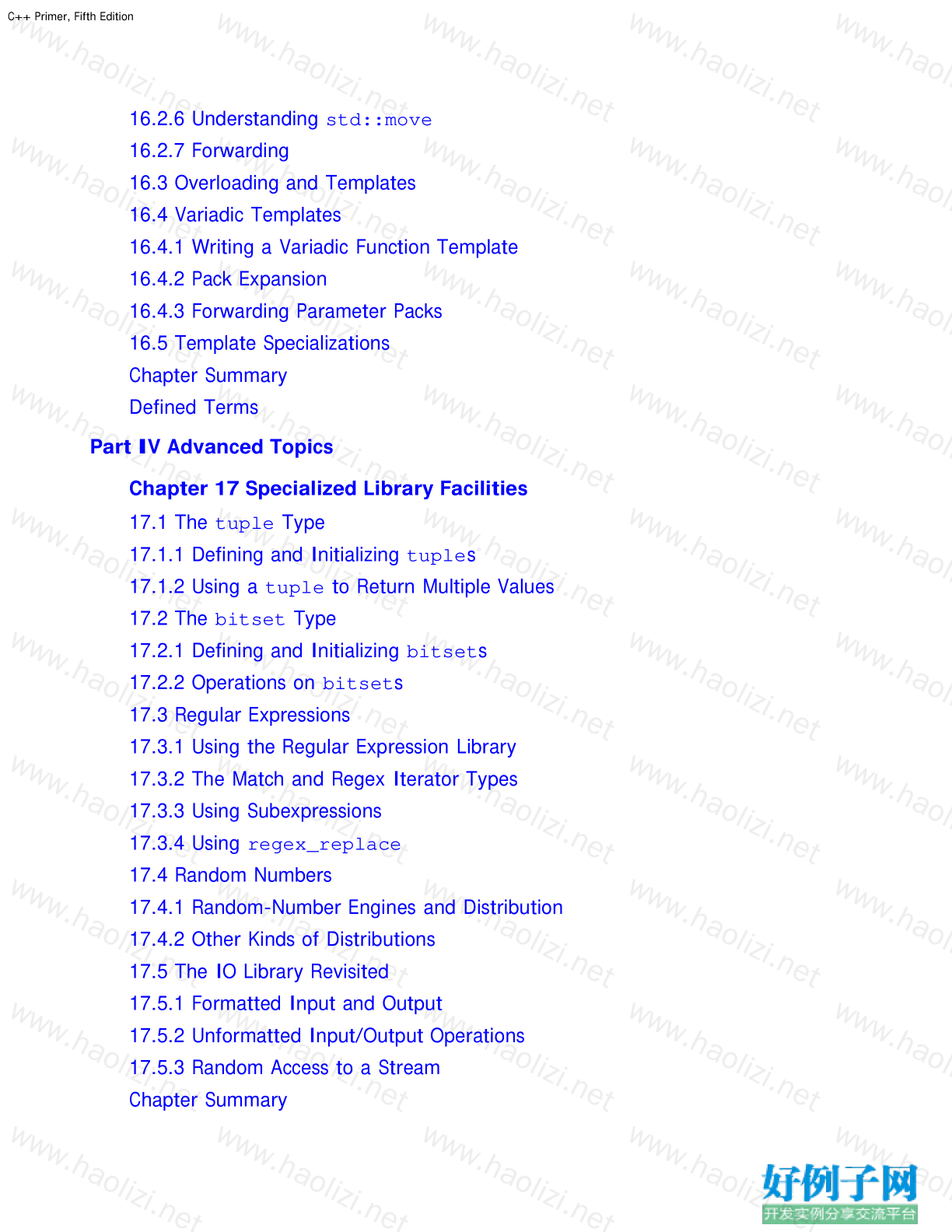
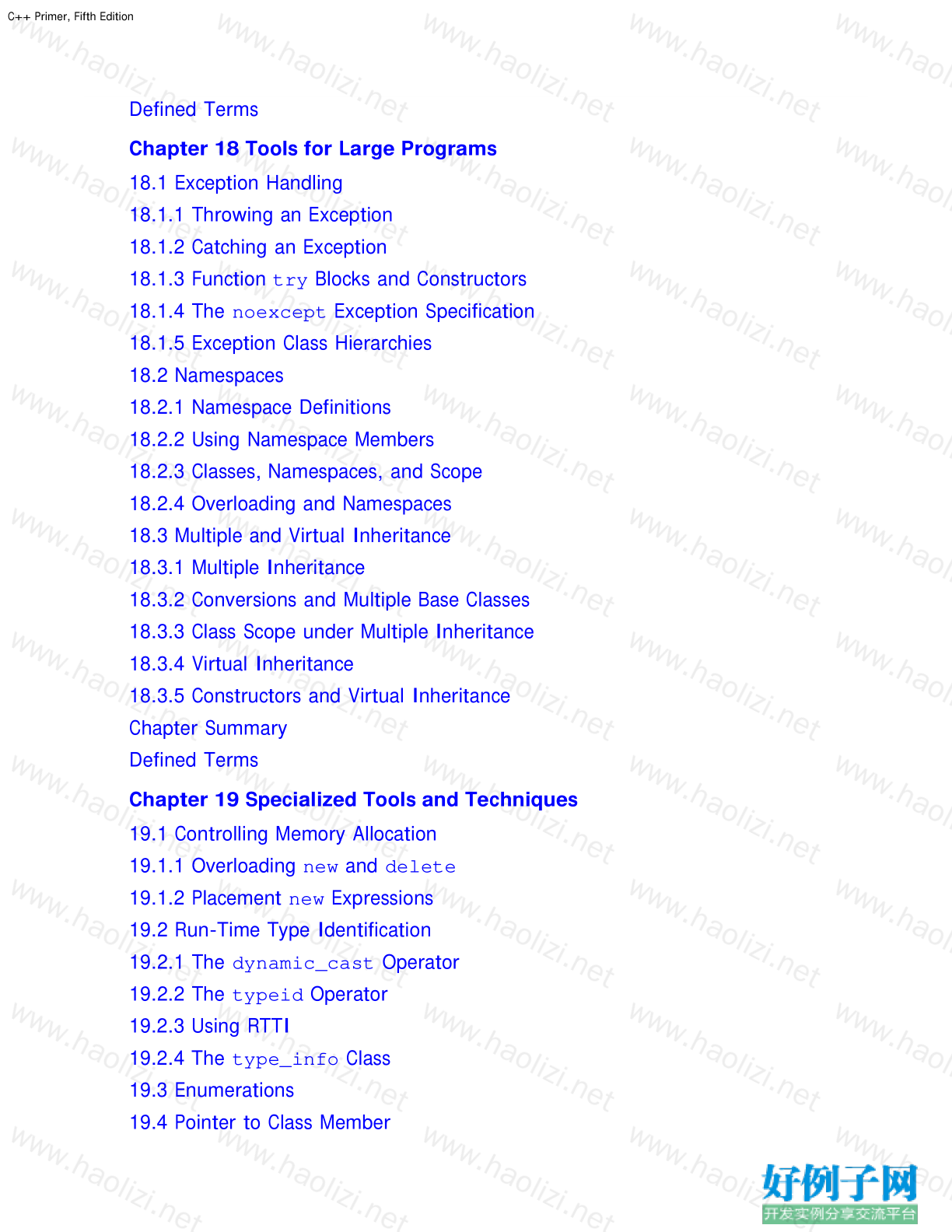

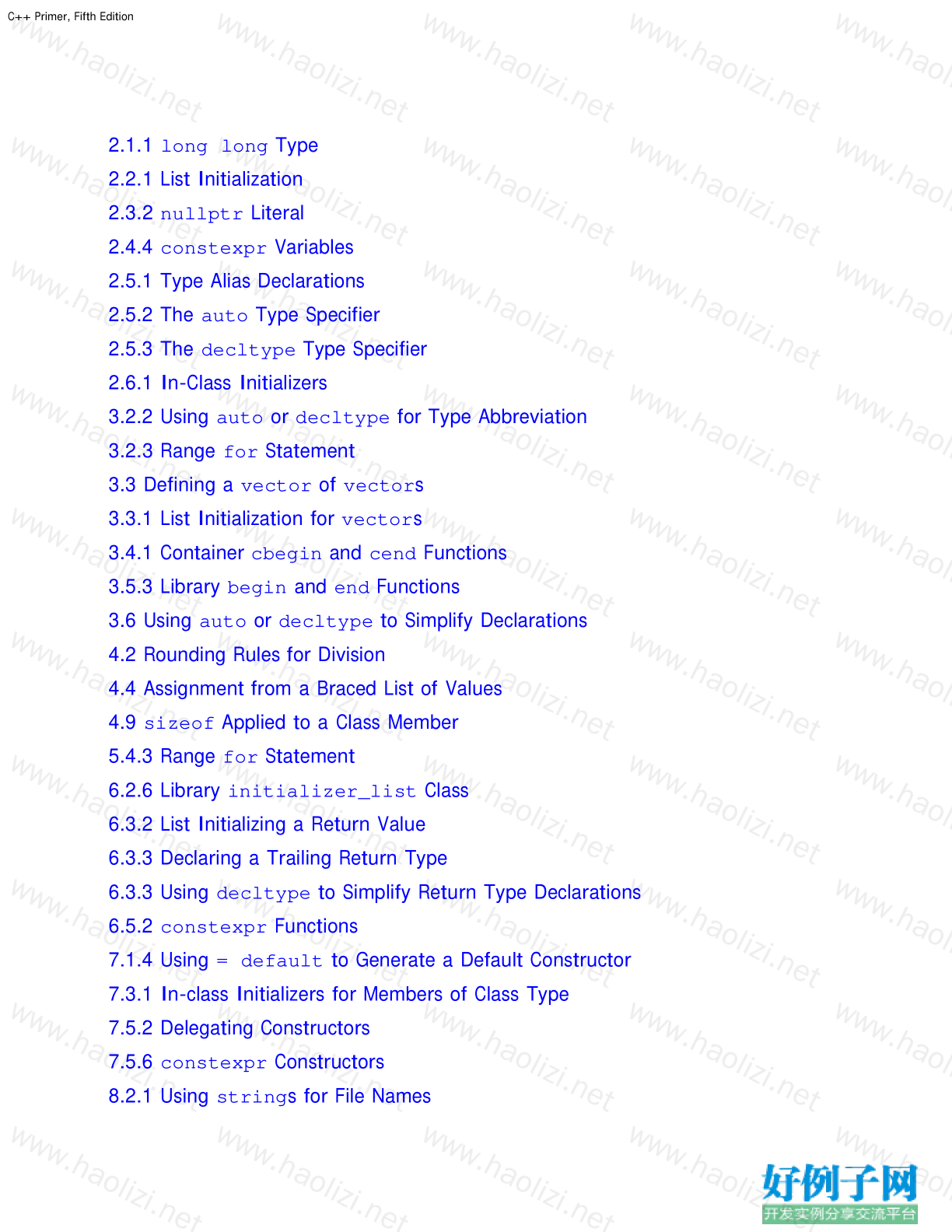
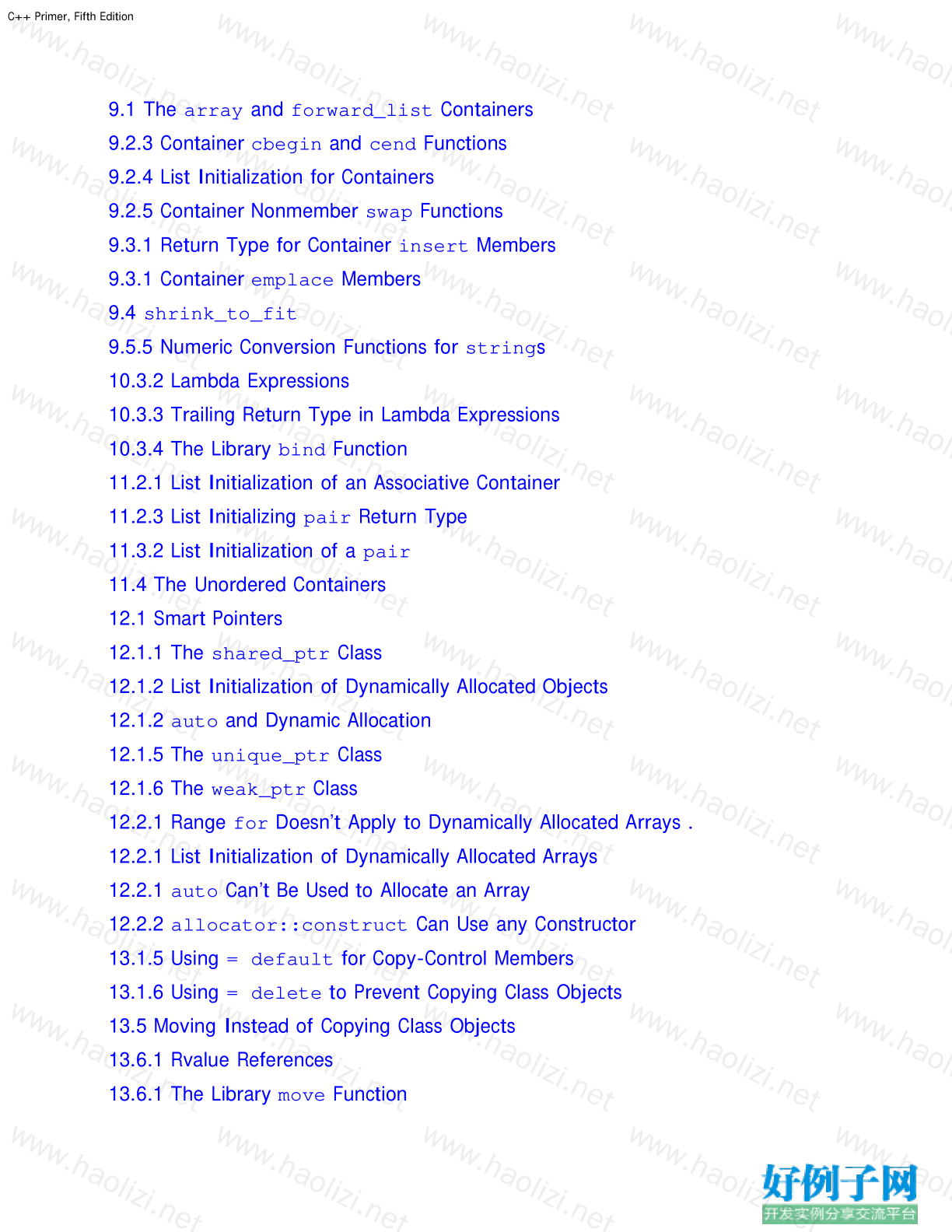
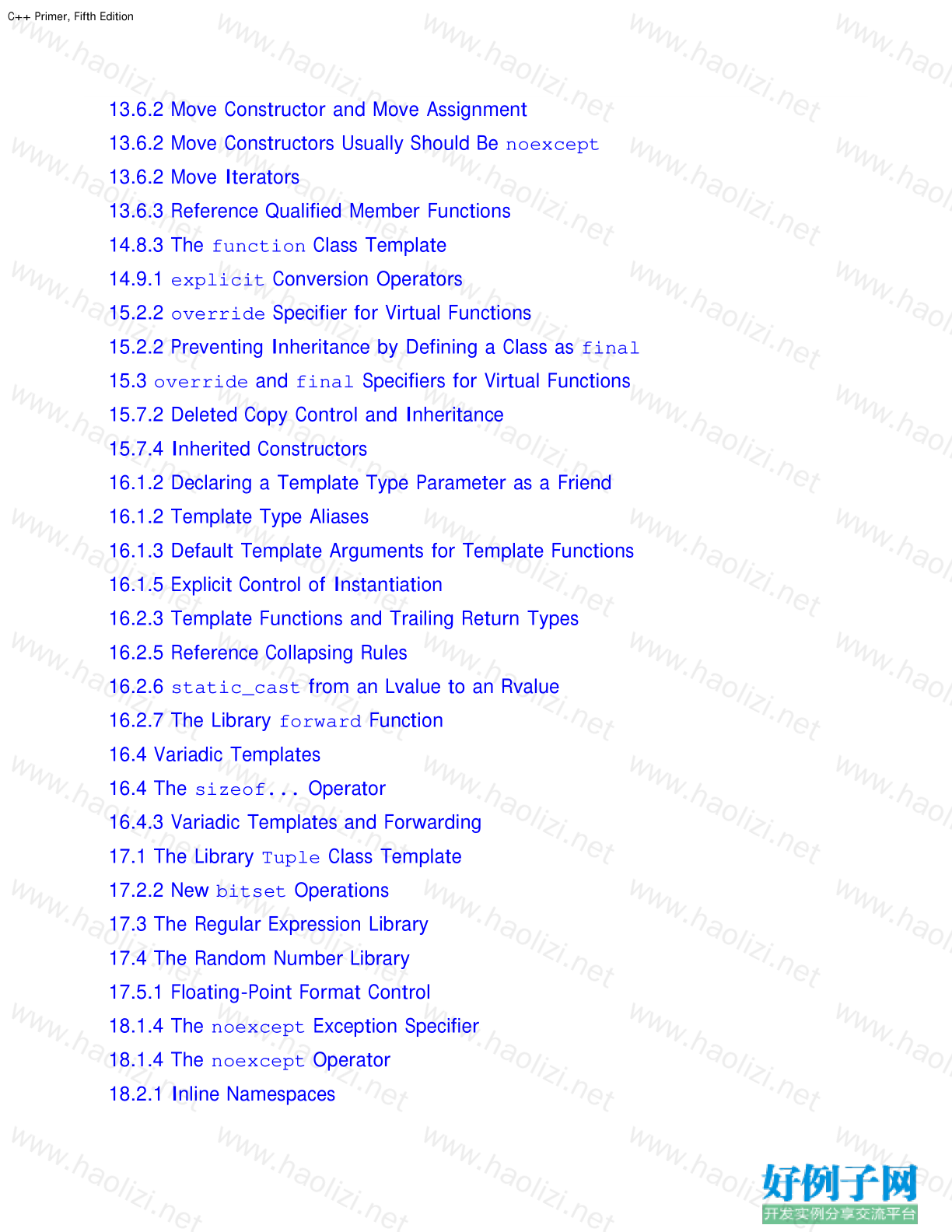
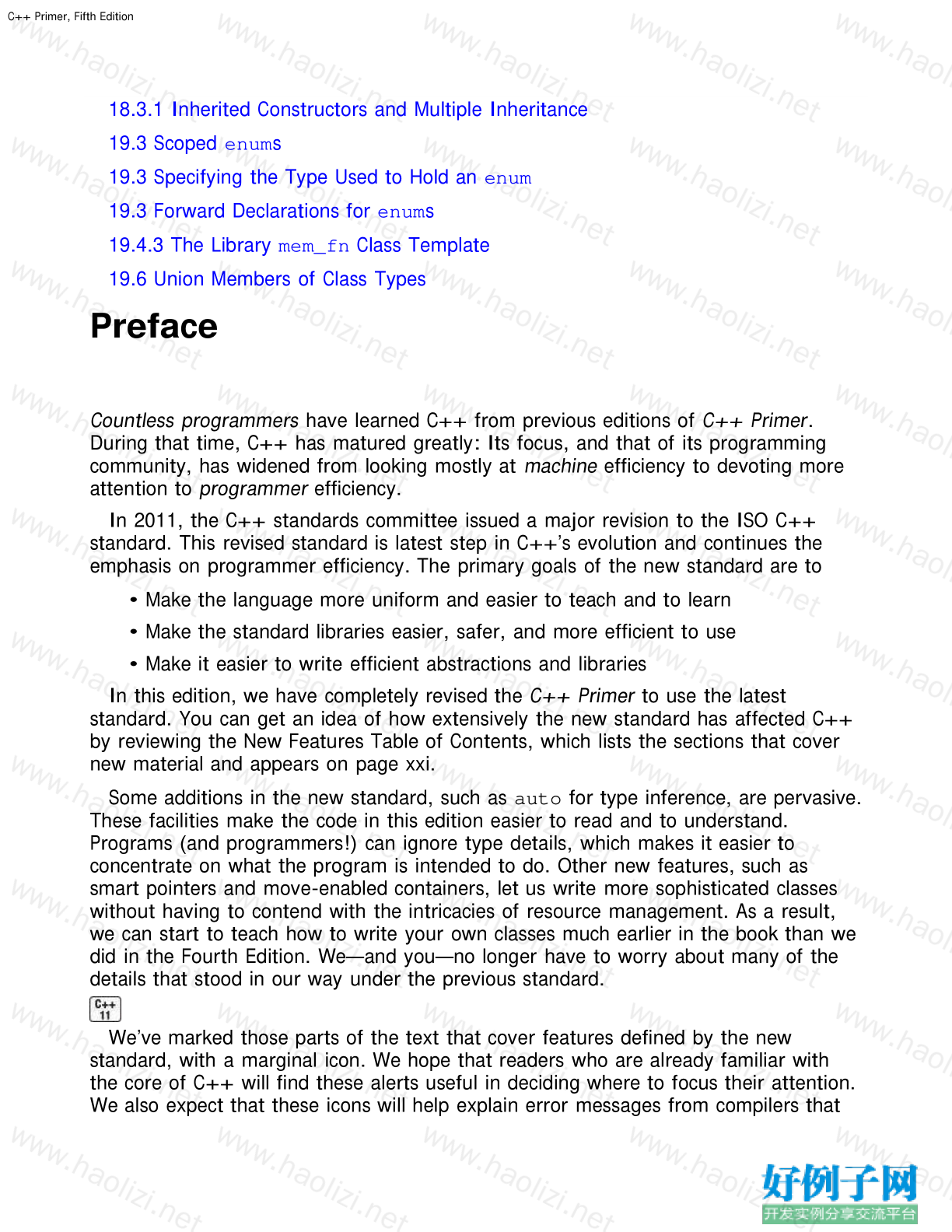
【核心代码】
Contents
Preface
Chapter 1 Getting Started
1.1 Writing a Simple C Program
1.1.1 Compiling and Executing Our Program
1.2 A First Look at Input/Output
1.3 A Word about Comments
1.4 Flow of Control
1.4.1 The while Statement
1.4.2 The for Statement
1.4.3 Reading an Unknown Number of Inputs
1.4.4 The if Statement
1.5 Introducing Classes
1.5.1 The Sales_item Class
1.5.2 A First Look at Member Functions
1.6 The Bookstore Program
Chapter Summary
Defined Terms
Part I The Basics
Chapter 2 Variables and Basic Types
2.1 Primitive Built-in Types
2.1.1 Arithmetic Types
2.1.2 Type Conversions
2.1.3 Literals
2.2 Variables
C Primer, Fifth Edition
2.2.1 Variable Definitions
2.2.2 Variable Declarations and Definitions
2.2.3 Identifiers
2.2.4 Scope of a Name
2.3 Compound Types
2.3.1 References
2.3.2 Pointers
2.3.3 Understanding Compound Type Declarations
2.4 const Qualifier
2.4.1 References to const
2.4.2 Pointers and const
2.4.3 Top-Level const
2.4.4 constexpr and Constant Expressions
2.5 Dealing with Types
2.5.1 Type Aliases
2.5.2 The auto Type Specifier
2.5.3 The decltype Type Specifier
2.6 Defining Our Own Data Structures
2.6.1 Defining the Sales_data Type
2.6.2 Using the Sales_data Class
2.6.3 Writing Our Own Header Files
Chapter Summary
Defined Terms
Chapter 3 Strings, Vectors, and Arrays
3.1 Namespace using Declarations
3.2 Library string Type
3.2.1 Defining and Initializing strings
3.2.2 Operations on strings
3.2.3 Dealing with the Characters in a string
3.3 Library vector Type
3.3.1 Defining and Initializing vectors
3.3.2 Adding Elements to a vector
C Primer, Fifth Edition
3.3.3 Other vector Operations
3.4 Introducing Iterators
3.4.1 Using Iterators
3.4.2 Iterator Arithmetic
3.5 Arrays
3.5.1 Defining and Initializing Built-in Arrays
3.5.2 Accessing the Elements of an Array
3.5.3 Pointers and Arrays
3.5.4 C-Style Character Strings
3.5.5 Interfacing to Older Code
3.6 Multidimensional Arrays
Chapter Summary
Defined Terms
Chapter 4 Expressions
4.1 Fundamentals
4.1.1 Basic Concepts
4.1.2 Precedence and Associativity
4.1.3 Order of Evaluation
4.2 Arithmetic Operators
4.3 Logical and Relational Operators
4.4 Assignment Operators
4.5 Increment and Decrement Operators
4.6 The Member Access Operators
4.7 The Conditional Operator
4.8 The Bitwise Operators
4.9 The sizeof Operator
4.10 Comma Operator
4.11 Type Conversions
4.11.1 The Arithmetic Conversions
4.11.2 Other Implicit Conversions
4.11.3 Explicit Conversions
4.12 Operator Precedence Table
C Primer, Fifth Edition
Chapter Summary
Defined Terms
Chapter 5 Statements
5.1 Simple Statements
5.2 Statement Scope
5.3 Conditional Statements
5.3.1 The if Statement
5.3.2 The switch Statement
5.4 Iterative Statements
5.4.1 The while Statement
5.4.2 Traditional for Statement
5.4.3 Range for Statement
5.4.4 The do while Statement
5.5 Jump Statements
5.5.1 The break Statement
5.5.2 The continue Statement
5.5.3 The goto Statement
5.6 try Blocks and Exception Handling
5.6.1 A throw Expression
5.6.2 The try Block
5.6.3 Standard Exceptions
Chapter Summary
Defined Terms
Chapter 6 Functions
6.1 Function Basics
6.1.1 Local Objects
6.1.2 Function Declarations
6.1.3 Separate Compilation
6.2 Argument Passing
6.2.1 Passing Arguments by Value
6.2.2 Passing Arguments by Reference
C Primer, Fifth Edition
6.2.3 const Parameters and Arguments
6.2.4 Array Parameters
6.2.5 main: Handling Command-Line Options
6.2.6 Functions with Varying Parameters
6.3 Return Types and the return Statement
6.3.1 Functions with No Return Value
6.3.2 Functions That Return a Value
6.3.3 Returning a Pointer to an Array
6.4 Overloaded Functions
6.4.1 Overloading and Scope
6.5 Features for Specialized Uses
6.5.1 Default Arguments
6.5.2 Inline and constexpr Functions
6.5.3 Aids for Debugging
6.6 Function Matching
6.6.1 Argument Type Conversions
6.7 Pointers to Functions
Chapter Summary
Defined Terms
Chapter 7 Classes
7.1 Defining Abstract Data Types
7.1.1 Designing the Sales_data Class
7.1.2 Defining the Revised Sales_data Class
7.1.3 Defining Nonmember Class-Related Functions
7.1.4 Constructors
7.1.5 Copy, Assignment, and Destruction
7.2 Access Control and Encapsulation
7.2.1 Friends
7.3 Additional Class Features
7.3.1 Class Members Revisited
7.3.2 Functions That Return *this
7.3.3 Class Types
C Primer, Fifth Edition
7.3.4 Friendship Revisited
7.4 Class Scope
7.4.1 Name Lookup and Class Scope
7.5 Constructors Revisited
7.5.1 Constructor Initializer List
7.5.2 Delegating Constructors
7.5.3 The Role of the Default Constructor
7.5.4 Implicit Class-Type Conversions
7.5.5 Aggregate Classes
7.5.6 Literal Classes
7.6 static Class Members
Chapter Summary
Defined Terms
Part II The C Library
Chapter 8 The IO Library
8.1 The IO Classes
8.1.1 No Copy or Assign for IO Objects
8.1.2 Condition States
8.1.3 Managing the Output Buffer
8.2 File Input and Output
8.2.1 Using File Stream Objects
8.2.2 File Modes
8.3 string Streams
8.3.1 Using an istringstream
8.3.2 Using ostringstreams
Chapter Summary
Defined Terms
Chapter 9 Sequential Containers
9.1 Overview of the Sequential Containers
9.2 Container Library Overview
9.2.1 Iterators
C Primer, Fifth Edition
9.2.2 Container Type Members
9.2.3 begin and end Members
9.2.4 Defining and Initializing a Container
9.2.5 Assignment and swap
9.2.6 Container Size Operations
9.2.7 Relational Operators
9.3 Sequential Container Operations
9.3.1 Adding Elements to a Sequential Container
9.3.2 Accessing Elements
9.3.3 Erasing Elements
9.3.4 Specialized forward_list Operations
9.3.5 Resizing a Container
9.3.6 Container Operations May Invalidate Iterators
9.4 How a vector Grows
9.5 Additional string Operations
9.5.1 Other Ways to Construct strings
9.5.2 Other Ways to Change a string
9.5.3 string Search Operations
9.5.4 The compare Functions
9.5.5 Numeric Conversions
9.6 Container Adaptors
Chapter Summary
Defined Terms
Chapter 10 Generic Algorithms
10.1 Overview
10.2 A First Look at the Algorithms
10.2.1 Read-Only Algorithms
10.2.2 Algorithms That Write Container Elements
10.2.3 Algorithms That Reorder Container Elements
10.3 Customizing Operations
10.3.1 Passing a Function to an Algorithm
10.3.2 Lambda Expressions
C Primer, Fifth Edition
10.3.3 Lambda Captures and Returns
10.3.4 Binding Arguments
10.4 Revisiting Iterators
10.4.1 Insert Iterators
10.4.2 iostream Iterators
10.4.3 Reverse Iterators
10.5 Structure of Generic Algorithms
10.5.1 The Five Iterator Categories
10.5.2 Algorithm Parameter Patterns
10.5.3 Algorithm Naming Conventions
10.6 Container-Specific Algorithms
Chapter Summary
Defined Terms
Chapter 11 Associative Containers
11.1 Using an Associative Container
11.2 Overview of the Associative Containers
11.2.1 Defining an Associative Container
11.2.2 Requirements on Key Type
11.2.3 The pair Type
11.3 Operations on Associative Containers
11.3.1 Associative Container Iterators
11.3.2 Adding Elements
11.3.3 Erasing Elements
11.3.4 Subscripting a map
11.3.5 Accessing Elements
11.3.6 A Word Transformation Map
11.4 The Unordered Containers
Chapter Summary
Defined Terms
Chapter 12 Dynamic Memory
12.1 Dynamic Memory and Smart Pointers
C Primer, Fifth Edition
12.1.1 The shared_ptr Class
12.1.2 Managing Memory Directly
12.1.3 Using shared_ptrs with new
12.1.4 Smart Pointers and Exceptions
12.1.5 unique_ptr
12.1.6 weak_ptr
12.2 Dynamic Arrays
12.2.1 new and Arrays
12.2.2 The allocator Class
12.3 Using the Library: A Text-Query Program
12.3.1 Design of the Query Program
12.3.2 Defining the Query Program Classes
Chapter Summary
Defined Terms
Part III Tools for Class Authors
Chapter 13 Copy Control
13.1 Copy, Assign, and Destroy
13.1.1 The Copy Constructor
13.1.2 The Copy-Assignment Operator
13.1.3 The Destructor
13.1.4 The Rule of Three/Five
13.1.5 Using = default
13.1.6 Preventing Copies
13.2 Copy Control and Resource Management
13.2.1 Classes That Act Like Values
13.2.2 Defining Classes That Act Like Pointers
13.3 Swap
13.4 A Copy-Control Example
13.5 Classes That Manage Dynamic Memory
13.6 Moving Objects
13.6.1 Rvalue References
13.6.2 Move Constructor and Move Assignment
C Primer, Fifth Edition
13.6.3 Rvalue References and Member Functions
Chapter Summary
Defined Terms
Chapter 14 Overloaded Operations and Conversions
14.1 Basic Concepts
14.2 Input and Output Operators
14.2.1 Overloading the Output Operator <<
14.2.2 Overloading the Input Operator >>
14.3 Arithmetic and Relational Operators
14.3.1 Equality Operators
14.3.2 Relational Operators
14.4 Assignment Operators
14.5 Subscript Operator
14.6 Increment and Decrement Operators
14.7 Member Access Operators
14.8 Function-Call Operator
14.8.1 Lambdas Are Function Objects
14.8.2 Library-Defined Function Objects
14.8.3 Callable Objects and function
14.9 Overloading, Conversions, and Operators
14.9.1 Conversion Operators
14.9.2 Avoiding Ambiguous Conversions
14.9.3 Function Matching and Overloaded Operators
Chapter Summary
Defined Terms
Chapter 15 Object-Oriented Programming
15.1 OOP: An Overview
15.2 Defining Base and Derived Classes
15.2.1 Defining a Base Class
15.2.2 Defining a Derived Class
15.2.3 Conversions and Inheritance
C Primer, Fifth Edition
15.3 Virtual Functions
15.4 Abstract Base Classes
15.5 Access Control and Inheritance
15.6 Class Scope under Inheritance
15.7 Constructors and Copy Control
15.7.1 Virtual Destructors
15.7.2 Synthesized Copy Control and Inheritance
15.7.3 Derived-Class Copy-Control Members
15.7.4 Inherited Constructors
15.8 Containers and Inheritance
15.8.1 Writing a Basket Class
15.9 Text Queries Revisited
15.9.1 An Object-Oriented Solution
15.9.2 The Query_base and Query Classes
15.9.3 The Derived Classes
15.9.4 The eval Functions
Chapter Summary
Defined Terms
Chapter 16 Templates and Generic Programming
16.1 Defining a Template
16.1.1 Function Templates
16.1.2 Class Templates
16.1.3 Template Parameters
16.1.4 Member Templates
16.1.5 Controlling Instantiations
16.1.6 Efficiency and Flexibility
16.2 Template Argument Deduction
16.2.1 Conversions and Template Type Parameters
16.2.2 Function-Template Explicit Arguments
16.2.3 Trailing Return Types and Type Transformation
16.2.4 Function Pointers and Argument Deduction
16.2.5 Template Argument Deduction and References
C Primer, Fifth Edition
16.2.6 Understanding std::move
16.2.7 Forwarding
16.3 Overloading and Templates
16.4 Variadic Templates
16.4.1 Writing a Variadic Function Template
16.4.2 Pack Expansion
16.4.3 Forwarding Parameter Packs
16.5 Template Specializations
Chapter Summary
Defined Terms
Part IV Advanced Topics
Chapter 17 Specialized Library Facilities
17.1 The tuple Type
17.1.1 Defining and Initializing tuples
17.1.2 Using a tuple to Return Multiple Values
17.2 The bitset Type
17.2.1 Defining and Initializing bitsets
17.2.2 Operations on bitsets
17.3 Regular Expressions
17.3.1 Using the Regular Expression Library
17.3.2 The Match and Regex Iterator Types
17.3.3 Using Subexpressions
17.3.4 Using regex_replace
17.4 Random Numbers
17.4.1 Random-Number Engines and Distribution
17.4.2 Other Kinds of Distributions
17.5 The IO Library Revisited
17.5.1 Formatted Input and Output
17.5.2 Unformatted Input/Output Operations
17.5.3 Random Access to a Stream
Chapter Summary
C Primer, Fifth Edition
Defined Terms
Chapter 18 Tools for Large Programs
18.1 Exception Handling
18.1.1 Throwing an Exception
18.1.2 Catching an Exception
18.1.3 Function try Blocks and Constructors
18.1.4 The noexcept Exception Specification
18.1.5 Exception Class Hierarchies
18.2 Namespaces
18.2.1 Namespace Definitions
18.2.2 Using Namespace Members
18.2.3 Classes, Namespaces, and Scope
18.2.4 Overloading and Namespaces
18.3 Multiple and Virtual Inheritance
18.3.1 Multiple Inheritance
18.3.2 Conversions and Multiple Base Classes
18.3.3 Class Scope under Multiple Inheritance
18.3.4 Virtual Inheritance
18.3.5 Constructors and Virtual Inheritance
Chapter Summary
Defined Terms
Chapter 19 Specialized Tools and Techniques
19.1 Controlling Memory Allocation
19.1.1 Overloading new and delete
19.1.2 Placement new Expressions
19.2 Run-Time Type Identification
19.2.1 The dynamic_cast Operator
19.2.2 The typeid Operator
19.2.3 Using RTTI
19.2.4 The type_info Class
19.3 Enumerations
19.4 Pointer to Class Member
C Primer, Fifth Edition
19.4.1 Pointers to Data Members
19.4.2 Pointers to Member Functions
19.4.3 Using Member Functions as Callable Objects
19.5 Nested Classes
19.6 union: A Space-Saving Class
19.7 Local Classes
19.8 Inherently Nonportable Features
19.8.1 Bit-fields
19.8.2 volatile Qualifier
19.8.3 Linkage Directives: extern "C"
Chapter Summary
Defined Terms
Appendix A The Library
A.1 Library Names and Headers
A.2 A Brief Tour of the Algorithms
A.2.1 Algorithms to Find an Object
A.2.2 Other Read-Only Algorithms
A.2.3 Binary Search Algorithms
A.2.4 Algorithms That Write Container Elements
A.2.5 Partitioning and Sorting Algorithms
A.2.6 General Reordering Operations
A.2.7 Permutation Algorithms
A.2.8 Set Algorithms for Sorted Sequences
A.2.9 Minimum and Maximum Values
A.2.10 Numeric Algorithms
A.3 Random Numbers
A.3.1 Random Number Distributions
A.3.2 Random Number Engines
Index
New Features in C 11
C Primer, Fifth Edition
2.1.1 long long Type
2.2.1 List Initialization
2.3.2 nullptr Literal
2.4.4 constexpr Variables
2.5.1 Type Alias Declarations
2.5.2 The auto Type Specifier
2.5.3 The decltype Type Specifier
2.6.1 In-Class Initializers
3.2.2 Using auto or decltype for Type Abbreviation
3.2.3 Range for Statement
3.3 Defining a vector of vectors
3.3.1 List Initialization for vectors
3.4.1 Container cbegin and cend Functions
3.5.3 Library begin and end Functions
3.6 Using auto or decltype to Simplify Declarations
4.2 Rounding Rules for Division
4.4 Assignment from a Braced List of Values
4.9 sizeof Applied to a Class Member
5.4.3 Range for Statement
6.2.6 Library initializer_list Class
6.3.2 List Initializing a Return Value
6.3.3 Declaring a Trailing Return Type
6.3.3 Using decltype to Simplify Return Type Declarations
6.5.2 constexpr Functions
7.1.4 Using = default to Generate a Default Constructor
7.3.1 In-class Initializers for Members of Class Type
7.5.2 Delegating Constructors
7.5.6 constexpr Constructors
8.2.1 Using strings for File Names
C Primer, Fifth Edition
9.1 The array and forward_list Containers
9.2.3 Container cbegin and cend Functions
9.2.4 List Initialization for Containers
9.2.5 Container Nonmember swap Functions
9.3.1 Return Type for Container insert Members
9.3.1 Container emplace Members
9.4 shrink_to_fit
9.5.5 Numeric Conversion Functions for strings
10.3.2 Lambda Expressions
10.3.3 Trailing Return Type in Lambda Expressions
10.3.4 The Library bind Function
11.2.1 List Initialization of an Associative Container
11.2.3 List Initializing pair Return Type
11.3.2 List Initialization of a pair
11.4 The Unordered Containers
12.1 Smart Pointers
12.1.1 The shared_ptr Class
12.1.2 List Initialization of Dynamically Allocated Objects
12.1.2 auto and Dynamic Allocation
12.1.5 The unique_ptr Class
12.1.6 The weak_ptr Class
12.2.1 Range for Doesn’t Apply to Dynamically Allocated Arrays .
12.2.1 List Initialization of Dynamically Allocated Arrays
12.2.1 auto Can’t Be Used to Allocate an Array
12.2.2 allocator::construct Can Use any Constructor
13.1.5 Using = default for Copy-Control Members
13.1.6 Using = delete to Prevent Copying Class Objects
13.5 Moving Instead of Copying Class Objects
13.6.1 Rvalue References
13.6.1 The Library move Function
C Primer, Fifth Edition
13.6.2 Move Constructor and Move Assignment
13.6.2 Move Constructors Usually Should Be noexcept
13.6.2 Move Iterators
13.6.3 Reference Qualified Member Functions
14.8.3 The function Class Template
14.9.1 explicit Conversion Operators
15.2.2 override Specifier for Virtual Functions
15.2.2 Preventing Inheritance by Defining a Class as final
15.3 override and final Specifiers for Virtual Functions
15.7.2 Deleted Copy Control and Inheritance
15.7.4 Inherited Constructors
16.1.2 Declaring a Template Type Parameter as a Friend
16.1.2 Template Type Aliases
16.1.3 Default Template Arguments for Template Functions
16.1.5 Explicit Control of Instantiation
16.2.3 Template Functions and Trailing Return Types
16.2.5 Reference Collapsing Rules
16.2.6 static_cast from an Lvalue to an Rvalue
16.2.7 The Library forward Function
16.4 Variadic Templates
16.4 The sizeof... Operator
16.4.3 Variadic Templates and Forwarding
17.1 The Library Tuple Class Template
17.2.2 New bitset Operations
17.3 The Regular Expression Library
17.4 The Random Number Library
17.5.1 Floating-Point Format Control
18.1.4 The noexcept Exception Specifier
18.1.4 The noexcept Operator
18.2.1 Inline Namespaces
C Primer, Fifth Edition
18.3.1 Inherited Constructors and Multiple Inheritance
19.3 Scoped enums
19.3 Specifying the Type Used to Hold an enum
19.3 Forward Declarations for enums
19.4.3 The Library mem_fn Class Template
19.6 Union Members of Class Types
标签: c++ primer Primer edit c++ PRI
小贴士
感谢您为本站写下的评论,您的评论对其它用户来说具有重要的参考价值,所以请认真填写。
- 类似“顶”、“沙发”之类没有营养的文字,对勤劳贡献的楼主来说是令人沮丧的反馈信息。
- 相信您也不想看到一排文字/表情墙,所以请不要反馈意义不大的重复字符,也请尽量不要纯表情的回复。
- 提问之前请再仔细看一遍楼主的说明,或许是您遗漏了。
- 请勿到处挖坑绊人、招贴广告。既占空间让人厌烦,又没人会搭理,于人于己都无利。
关于好例子网
本站旨在为广大IT学习爱好者提供一个非营利性互相学习交流分享平台。本站所有资源都可以被免费获取学习研究。本站资源来自网友分享,对搜索内容的合法性不具有预见性、识别性、控制性,仅供学习研究,请务必在下载后24小时内给予删除,不得用于其他任何用途,否则后果自负。基于互联网的特殊性,平台无法对用户传输的作品、信息、内容的权属或合法性、安全性、合规性、真实性、科学性、完整权、有效性等进行实质审查;无论平台是否已进行审查,用户均应自行承担因其传输的作品、信息、内容而可能或已经产生的侵权或权属纠纷等法律责任。本站所有资源不代表本站的观点或立场,基于网友分享,根据中国法律《信息网络传播权保护条例》第二十二与二十三条之规定,若资源存在侵权或相关问题请联系本站客服人员,点此联系我们。关于更多版权及免责申明参见 版权及免责申明



网友评论
我要评论